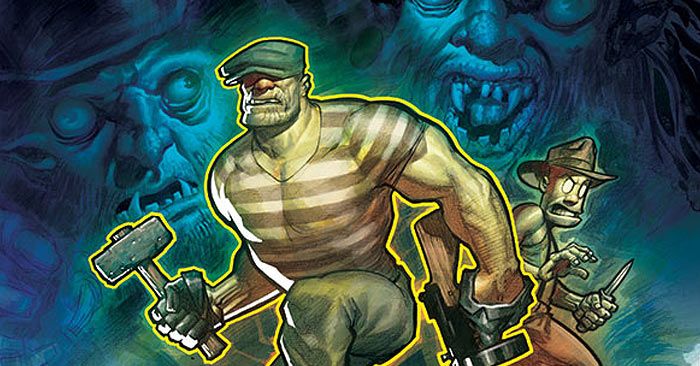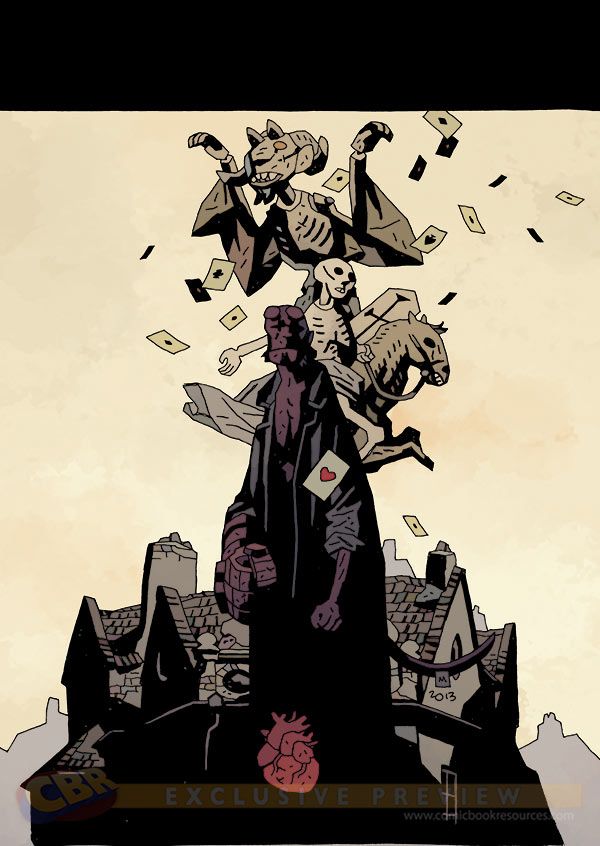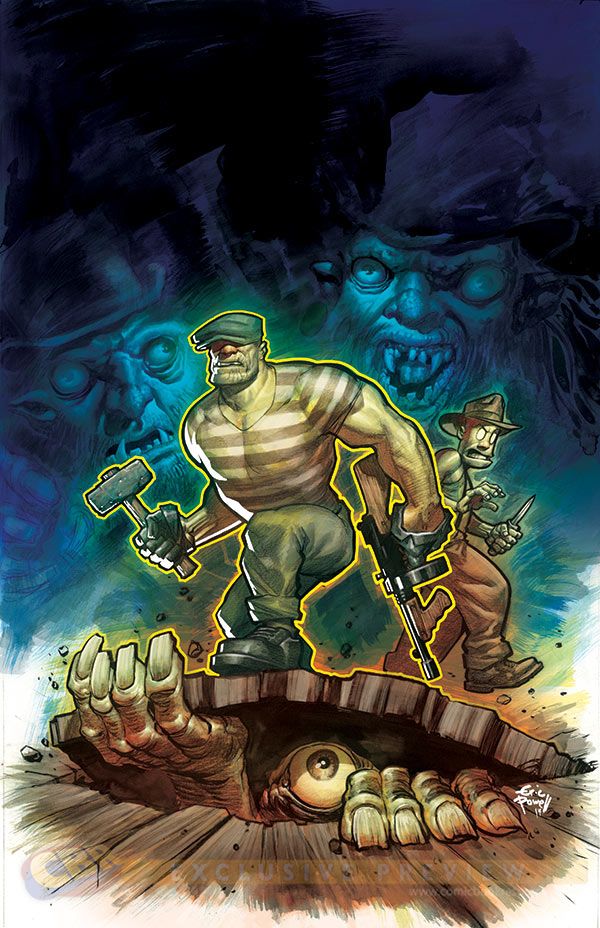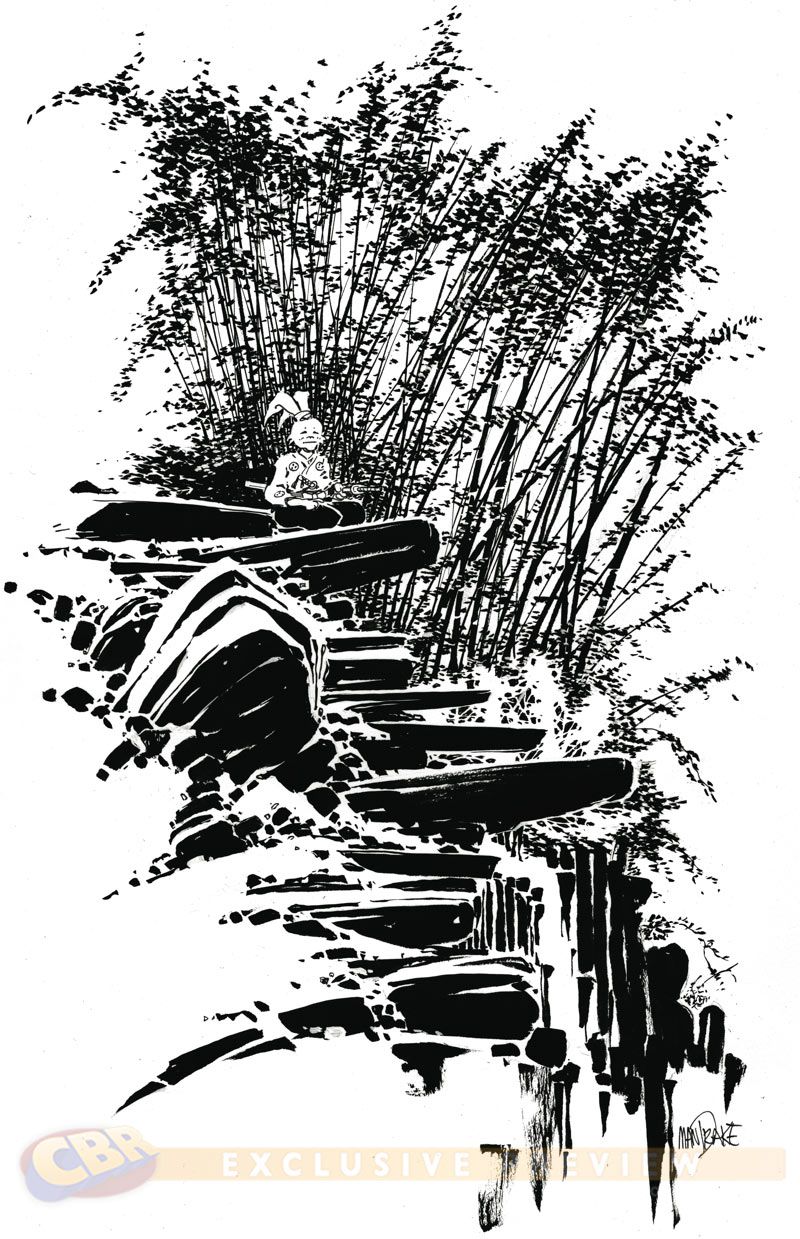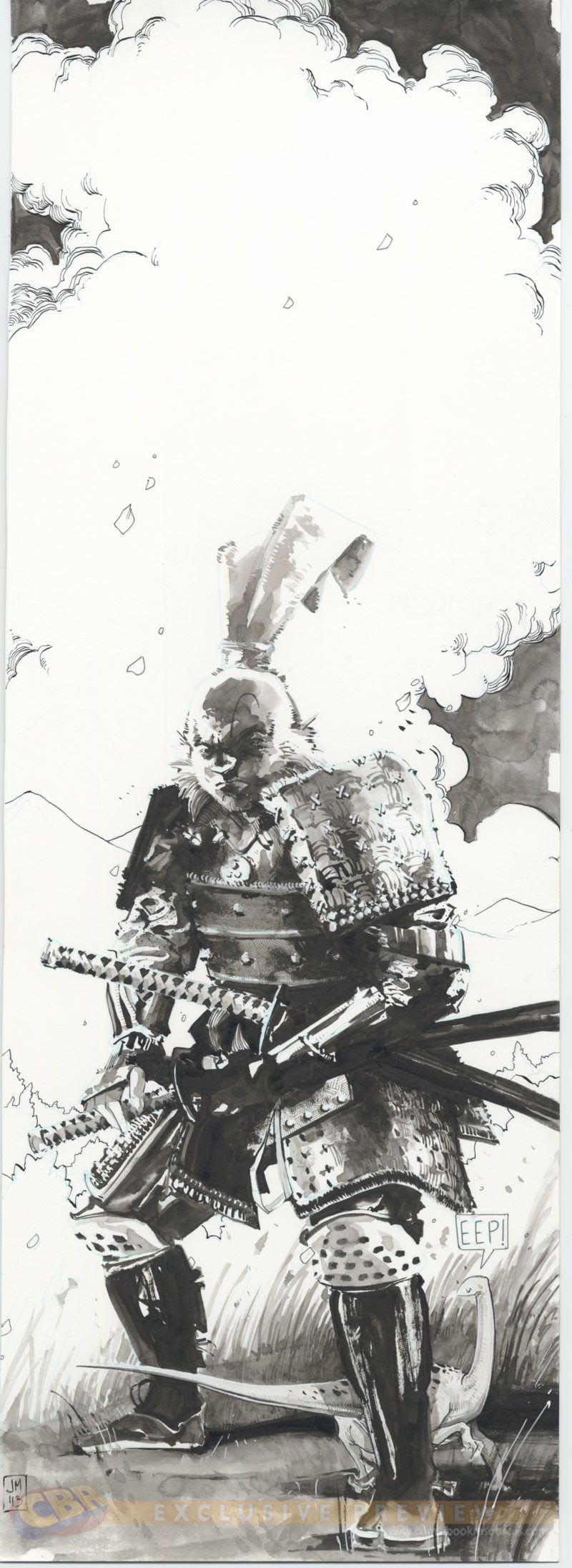Mike Richardson wants to remind the comics community that Dark Horse is the original home of creator-owned comics.
Over the past several years, ownership and control resting in the hands of creators has become a hot button topic in the industry, with Image Comics leading the charge. But as Publisher of Dark Horse, Richardson is quick to stake the company's claim to continuing to be an oasis for writers and artists looking to make their own way. And as he tells CBR, 2014 will be a year where Dark Horse expands its creator-owned offerings with renewed enthusiasm.
As the finale of our YEAR OF THE HORSE series of in-depth interviews, we spoke with Richardson about what Dark Horse defines as its goals for creator-owned comics, how the publisher sells itself to comics makers in an increasingly crowded and competitive field, why series from the likes of Mike Mignola, Eric Powell and Frank Miller serve as a model for where they want to go next and what other offerings are on the horizon including "The Sakai Project" tribute book for "Usagi Yojimbo's" ,a href="https://www.comicbookresources.com/tag/stan+sakai">Stan Sakai.
CBR News: Mike, since we started these Year of the Horse chats, you've been mentioning Dark Horse's interest in expanding its creator-owned line, so for the finale, let's see if we can't get more specific on that front. All thing told, what made this an area of the business you really wanted to focus on in 2014?
Mike Richardson: Look -- from the beginning our whole approach was to find creators free of the traditional "Big Two" yoke. I'm not saying anything bad about those companies; they have their business model. But I was an art major, and then I went into business, and when I started hearing horror stories of creators who didn't own their material and artists who didn't own their artwork and all those tales we all know so well, I started to think of a company with a different attitude. It's a place where creators have a say in their creations and where they can take control of the trademarks and copyrights on their material and then get paid for what they do. They may take a little more of the risk, but ultimately they get the reward. So we founded the company, back when I started things and brought Randy [Stradley] on, with the idea that we'd say, "You can come to Dark Horse and create the things you want, in an environment that's friendly. We'll allow you to create what you want and do the best work you can do."
As time went by, we've never strayed from that goal. But in the meantime, we've done the licensed books as well, and when you're doing "Star Wars" and "Aliens Vs. Predator," the message can get lost amidst some of the media-based books we do. Over the years, we've seen that more and more creators opting to strike out on their own. Recently, encouraged by the success they've seen [Robert] Kirkman have with "The Walking Dead," they see those possibilities more. Of course, people like Mike Mignola and Frank Miller and many others already learned that lesson. If they create strong characters and keep them going and can gain any traction out in the world, it's a very profitable way for them to go. Even the creators who aren't quite as successful as those examples, as they build a library and expand their work under their own name, their worth increases the longer they stick with it. In most cases, there's a way to make that work.
So for us, it's time to sit down and look at the way the world exists today -- because it's a very different world in comics than it was back in 1986 -- and see the realities of publishing and where creators are at. There are a lot more places for them to go than there were when I started Dark Horse. I don't know if anyone understands today that we spearheaded the creator-owned movement. Image was years away, and any kind of company that offered those rights and those freedoms hadn't happened yet. We spearheaded that, and I think that fact has been lost over the years. So I just wanted to make it clear that we're back. I mean, we never went away. [Laughs] But we're back putting a big focus on creator-owned. We want creators to do the best work they've ever done and to help them publish great books. We want to create an environment that helps them do the work they'd like. We're working right now with many creators, and I think that gets lost in the news that we're losing Star Wars or some other thing.
But we've got a lot of new creator-owned books on tap for this year, and we're going to go after many more. We're trying to make deals that work for each creator, and we're being flexible with how we look at things. We've made it our goal for the year to strengthen that creator-owned line and find strong titles to add and artists and writers who can join the great creator-owned visions we have right now.
Image has certainly had a lot of success and a lot of heat in the market recently. Considering how strongly they're recruiting from the comics talent pool right now, what do you say to a creator you're courting in terms of why Dark Horse is a place they should bring their project?
Well, we want them to know that we have a plan. We tell them how the plan works over a long period of time, and we talk about the success that creators who have worked with us have had. I think it's great that Image has some really successful books right now, but you've got to remember that the average creator does not see the kind of numbers that a Kirkman or some of their other successes have had. We have our creators doing the same kind of excellent numbers. Obviously, Frank does huge numbers; any time Frank comes out with a new book, people want to see what that is. It's the same thing with people like Mike Mignola, and Eric Powell has made a huge success out of "The Goon." Creators like that have such success because they build their libraries and their worlds, and the readership builds up around them over time. And when you have royalties coming in on the sixth or seventh trade and continuing every time there's a new one out, you get a spike each time. That's a plan I pitch to a lot of creators.
Plus, we try to work out a financial deal with them where they can live off the creative work they own and control. Our goal, initially, is to publish their work and add creators we'd love to have in our line to our existing lineup. They can control everything else. If they want to do movies or merchandise or any of that other stuff with other people, that's fine. Obviously, we have divisions that are involved in that as well, and we've got very good deals on that front. But if they want to take it elsewhere, that's their choice. The heart of our company is our comics line, and the heart of our comics line is our creator-owned work. I know people may get a different impression of the line, but that's really the stuff that's near and dear to my heart. And if I like a creator's work, I'm going to go after him. He may not want to work with us, but we're going to give him as many reasons as we can to come to Dark Horse.
We've got a long history with this. I think our books are the best looking books in the market -- not just from the creative work inside, but the whole package. If you look at what we offer, you can see that we work hard on every single book. I don't know about the other companies, but we have our own design department in house. We have our own Art Director. We have a full marketing department. We are a full service publisher, and I don't know if that's true of every publisher out there. So we can offer a lot of resources that other publishers may not have. For some creators, that's a big plus.
I think we have to do a better job of selling what we do have to creators so they know what they can get at Dark Horse. But when you combine resources with a deal that works for the creator and a solid overall plan, I think a lot of creators will give us the opportunity. We're signing creators all the time.
You mention Mike Mignola's Hellboy universe as a huge success for Dark Horse, and I know I've spoken to Mike about how it's strange sometimes for him to think of this as a simple creator-owned book because that line has gotten so big, with so many outside collaborators and regulars coming in to work on it. What part of your overall creator-owned strategy does a franchise like that represent?
Obviously, it depends on the creator, but Mike created such a rich world, and hinted at so many elements in the early Hellboy stories, that I encouraged him back then to expand out. Now, there's only so much Mike can do by himself, but he can plot and share ideas, and he can add new characters or expand the ones that were introduced. "B.P.R.D." was, of course, spun out into its own series, and as time has gone by, the Mignola-verse has been something he controls and decides what he wants to do and who he wants to bring in. Mike's a great example of absolute and total control of his IP. Lucky for us, we're a willing partner to make all of that happen.
I think any creator can have that. I know there's a certain appeal for creators to work on the classic characters like Batman, Superman and Spider-Man, but I've said this before: I asked creators who have worked on those books who the people were doing the books ten years ago, and they don't know! But I can say, "Who worked on 'Sin City?'" and they'll go "Frank Miller." Who worked on Hellboy? Mike Mignola. Who worked on The Goon? Eric Powell. They know it instantly. So to me, the lure of creating your own character and owning it -- owning your own universe and being associated with that -- in the long run for talented writers and artists makes me question why someone would toil away on a company owned character for years and years of their lives.
I think it's better to do your own thing, whether that be at Dark Horse or Image or any other company that offers the ability to go out and create their own IP and own it. I think that's the world. That's the future. There are all kinds of entertainment distribution technology being created as we sit here, and what they desperately need is IP. What Mike has done is created something that's been successful in many of those channels. There are adjustments that have to be done, of course, but we've done two live action Hellboy movies and two animated movies, and Mike's been involved with all of that. There have been novels and toys, and Mike's involved with all that. He has the final say. It's his property. Given the chance, he's embraced those opportunities, just as Frank and others have. And what it gives Mike the freedom to do is to do the books he wants, when he wants. And if he wants to do something else, he can. He's taken on other projects with other people in between things. There's nothing tying him down to Dark Horse. But we've had a long relationship, and we've worked hard on his stuff. I think he appreciates that.
With Eric Powell, I know for a while, the thing we were talking the most about was his quest to get an animated film off the ground, but we haven't seen new issues of the series in a bit. Is there more "Goon" on tap soon?
I just had breakfast with Eric, and I think he's re-inspired. He says he's back at it. He needed a little break, but now he's ready to go. His plan is to start putting books out monthly, again. Everyone fights ups and downs with regard to our energy levels, so I think he needed a little break, but now he's recharged and ready to go as of last week. He's working on a one-shot, to be followed by a new series.
Another very unique creator-owned series at Dark Horse is Stan Sakai's "Usagi Yojimbo." I know Stan is planning on getting back to the main series soon, and you just announced the "Sakai Project" tribute book and a fundraiser, which features a number of artists, to help him and his wife with medical costs. I spoke to Stan when "Usagi" #100 came out, and I got the impression that he likes to just keep driving forward with that story with no stops or guest artists or ricketa racketa. Is that part of how the format for this tribute came together as a stand alone volume?
Well, Stan is clear in his mind what he wants to do, and we try to accommodate him. He's built up quite a library of "Usagi" over the years, as well as "Space Usagi." He's got some new stuff coming up soon, and as you know, he just did "47 Ronin" with me. But in the meantime, he's had a lot of personal things he's had to go through of late. We love Stan. He's one of the best people you could ever meet -- a thoughtful, caring person. He's like family, and when something awful happens to a member of the family, you want to find a way to help. The benefit book we're doing -- which we've been overwhelmed by the response to -- is an idea Bill Morrison called me with. I thought it was a great idea, and we jumped at the chance to organize it. We hope we can really help out, but what's most important to Stan is the outpouring of affection that's resulted. He can see the response. Sometimes, when you're a creator sitting at a board, you wonder if anyone notices. I think, for both he and Sharon's spirits, this effort has been really encouraging.
And the talent here is really a huge range of people -- not just Dark Horse regulars, but folks like Matt Groening. I'm betting with Stan's reputation that you had people knocking down the door to contribute.
It's true. It's been pretty amazing. In fact, I've had a lot of writers contacting me and saying, "How can I help?" It's a bit harder if you're not an artist to be involved in this particular project, but I think it shows the extent that Stan has affected the industry. It truly is an amazing show of affection and support for Stan, and he deserves it. He's just as good a person as you could ever meet. Forget the art and the books. He's just a wonderful person.
Moving forward with the whole line, I know a lot of creator-owned projects, like the incoming "White Suits," have been launched first in "Dark Horse Presents" with follow ups of full series. Do you anticipate that will be a model you'll continue to work as new series are announced?
Sure. The great thing is that we have projects like "Resident Alien," which started [in "DHP"] and has become a series on its own and has brought some wider entertainment possibilities. There are a number of projects that start in "DHP" and become series. A lot of the time, I'll approach a creator about working with us, and they'll say, "I'm doing this project and that one. I don't have the time." So I say, "Well, how about eight pages a month?" and they can do that. Then we can collect that later into pamphlet, or -- if there's enough work -- a trade. I'm always on the look for new projects for that series, and we've got editors here looking for pitches for new creator-owned projects as well.
You've turned over some cards on 2014 over the course of these interviews, and I get the sense there are more projects to be announced for later in the year. But overall, what do you want to leave as your overall goal to accomplish in publishing this year?
Our goal is to really sustain the momentum that we gained last year. I think I mentioned this before, but 2013 was by far the best year we ever had. Our business was up by roughly 30%, which is an astonishing number. We've expanded our line and have more pamphlets coming out than ever before. It's a crowded market, but we want our stuff to shine from every aspect.
Our big initiative for the year is more creator-owned work. We want more of those books on our schedule, and we feel a new energy here. We're going after some great projects, and as we announce some of what we've gotten, people are going to be surprised. When we've done pushes behind creators in the past, we've had great success, and so, here we go again.

